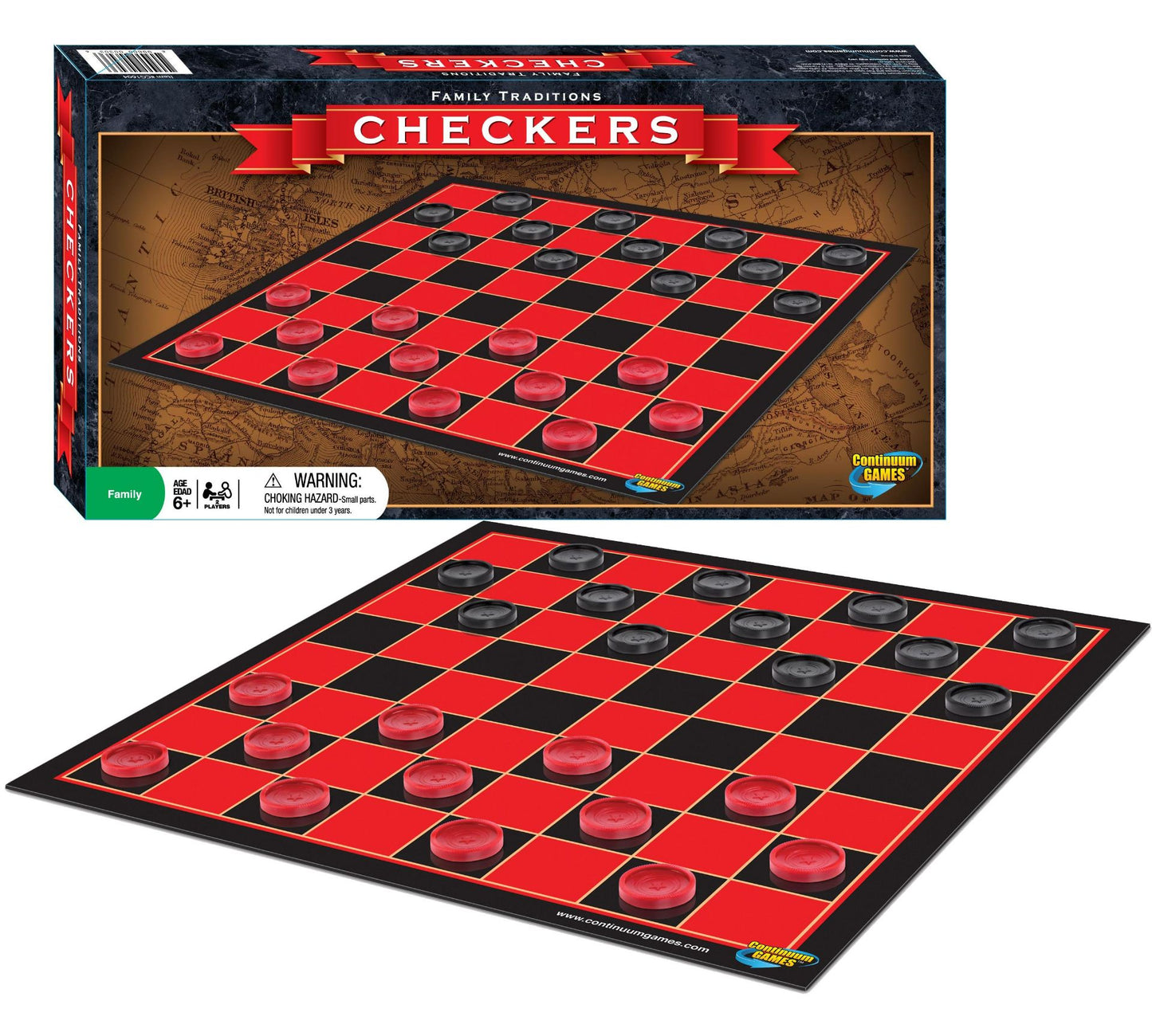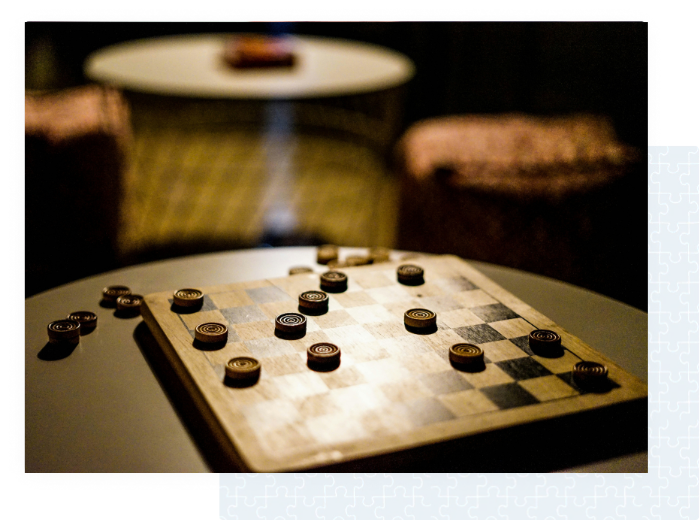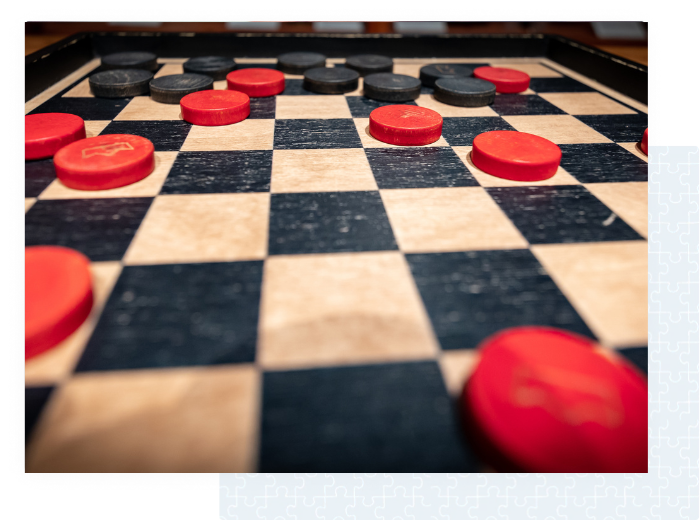Our Products
Checkers
Checkers
Couldn't load pickup availability
*All pictures shown are for illustration purpose only. Actual product may vary.
Products available through Always Home Connected are sold for adult use and are not intended for use by children.
Product Size
Product Size
A standard checkers game board typically measures around 12 inches by 12 inches. The checkers pieces are usually about 1.25 inches in diameter.
Material
Material
The game board is typically made of cardboard or wood, while the checkers pieces are made of durable plastic or wood. The playing surface may be designed for ease of movement.
Benefits
Benefits
Cognitive Stimulation: Checkers involves strategic thinking, planning, and problem-solving, providing cognitive stimulation and mental exercise.
Social Interaction: Playing checkers with others encourages social interaction, communication, and companionship, which is especially valuable for individuals with dementia.
Entertainment: The game offers entertainment and enjoyment, reducing stress and promoting a sense of accomplishment upon winning.
Delivery Info
Delivery Info
The delivery time and cost depend on where you live, when purchased and if in-stock.
Relevance to Dementia Stage
Relevance to Dementia Stage
Early Stage: Checkers is suitable for individuals in the early stage of dementia. The game's cognitive challenges can help maintain mental acuity and foster social interaction.
Middle Stage: In the middle stage, simplified versions of the game or adaptations to accommodate cognitive abilities may be more relevant. Playing checkers can provide entertainment, social engagement, and a sense of accomplishment.
Late Stage: In the late stage, very simplified versions or modified games may be appropriate, with a focus on the social aspects of play and familiarity with the game.


Checkers Board Game
Welcome to the world of checkers! Whether you have ample experience or are a novice, this timeless traditional pastime will provide an enjoyable and thought-provoking experience suitable for individuals spanning all age groups.
What Is Checkers Game Board?
Checkers is a board game that involves two (2) players and is played on a checkered board comprising 64 squares.
The objective of the game is for players to strategically move their pieces diagonally across the dark squares, with the intention of capturing their adversary's pieces and ultimately emerging victorious.

How to Play Checkers Board Game
Get ready for some checkers game board fun! Here's a breakdown of how to play:
Setting Up:
- Use a checkers board with 64 squares (alternating dark and light squares).
- Each player takes 12 pieces of their chosen color and places them on the dark squares closest to them (three rows).
- The player with the darker-colored pieces usually goes first.
Making Moves:
- Players take turns moving one piece at a time.
- Pieces can only move diagonally one square forward onto an empty dark square.
- If an opponent's piece occupies the diagonal square directly ahead, your piece can jump over it, capturing and removing it from the board.
Capturing and Jumping:
- If a jump move is available, it is mandatory to capture the opponent's piece.
- You can continue jumping over additional opponent pieces in the same turn if the opportunity arises (as long as the squares are diagonal and unoccupied).
Kinging:
- When a piece reaches the opposite end of the board (your opponent's starting row), it becomes a "king."
- Kings can move and jump both forward and backward diagonally.
Winning the Game:
- The first player to capture all their opponent's pieces or leave them with no moves wins the game!

Checkers Board Game Rules
Here's a brief overview of the fundamental checkers board game rules:
- In the checkers game board, participants alternate their movements by advancing a single piece in a diagonal direction during each turn.
- On an unoccupied dark square, the pieces have the ability to advance one square in a forward direction.
- When a piece belonging to your adversary is present on the diagonal square immediately in front, you have the ability to leap over it with your own piece, resulting in its capture and removal from the game board.
- When a jump move is possible, it is obligatory to seize the opponent's piece.
- Once a game piece arrives at the opposing side of the board (the initial row of the opponent), it attains the status of a king. Kings possess the ability to move and capture in both forward and backward diagonal directions.

The Benefits of Board Games With Checkers For Dementia Patients
Research has indicated that engaging in board games such as checkers can offer advantages to individuals with dementia. The cognitive stimulation experienced through formulating strategic choices and devising tactics can contribute to the enhancement of memory, concentration, and overall cognitive capabilities.
Moreover, social interactions and active participation within the game can foster a feeling of connectivity and meaning, which are vital for one's overall welfare! And keep in mind that the key element is to experience enjoyment and have a pleasant time while engaging in the game!
FAQ
Can dementia patients play checkers?
Indeed, checkers can serve as a highly beneficial pastime for individuals suffering from dementia. The straightforward regulations and visual prompts facilitate both comprehension and engagement, while the strategic elements provide cognitive stimulation and advantageous cognitive outcomes.
How do you play checkers for adults?
Although the fundamental principles apply universally, adults possess the ability to explore the strategic dimensions of the game in greater depth. Enhancing gameplay can be accomplished by acquiring proficiency in techniques such as enforcing jumps, establishing advantageous positions, and preemptively anticipating the actions of one's opponent.
Is checkers good for the brain?
Engaging in checkers has the potential to enhance cognitive abilities by activating diverse regions of the brain associated with memory, strategizing, and resolving challenges. Additionally, it can enhance attentiveness and concentration.
Is checkers harder than chess?
Although checkers possess rules that are comparatively less complex, both games present different degrees of intricacy based on one's strategic approach. At the novice level, checkers may be more accessible to comprehend due to its restricted range of piece movement choices. Nevertheless, both games offer a level of strategic complexity that can engage players at any proficiency level.
Is checkers a game for adults?
Undoubtedly! People of various age groups, ranging from young children to mature adults and seniors, derive pleasure from playing checkers. With checkers' board game rules that are straightforward, it becomes accessible to novice individuals, while the presence of strategic complexity provides a stimulating experience for seasoned players.
